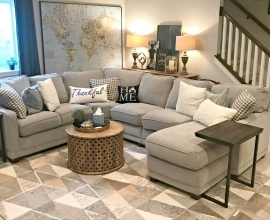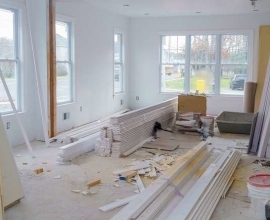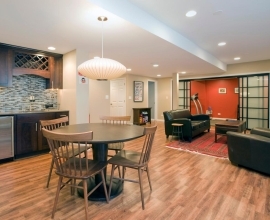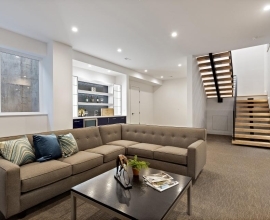Best Flooring For Basements
There is so much that can be done with a basement space these days. With the abundance of basement ideas and uses, you can transform an unfinished basement into a usable space your entire family can love. But there are some key things you need to know about basements, particularly the flooring.
Flooring for basements is not just about the look. Due to the nature of basements, i.e. a room prone to moisture and cold, the type of basement flooring that you choose is very important, and there are a number of factors that you need to consider when selecting the right choice for your basement. And depending on the type of flooring you use, it can greatly enhance the room and make it more suitable for certain purposes.
CHALLENGES WITH BASEMENT FLOORING
Basements are unique to any other room in a home. They require a certain amount of knowledge when it comes to selecting the best flooring for your basement. There can be challenges mainly because basements are below ground level, making them more prone to dampness than other rooms in your home. Moisture can ruin your basement flooring and the last thing you want to do is have to rip up your floors due to water damage.
Since the wrong type of flooring can create a huge problem when exposed to moisture, you need to avoid using flooring that consists of natural materials like wood. This is because wood does not tolerate moisture well and mildew and mould tend to thrive in natural materials. Mildew and mould can affect your health, and if allowed to grow underneath floorboards, will escape into the air and into the lungs of you and your family. Needless to say, hardwood floors are a big No-No in a basement.
BEST BASEMENT FLOORING OPTIONS
What you should be looking for when it comes to basement flooring are floors that consist of materials that are moisture friendly. These are referred to as “below grade” flooring. When we think of the term “below grade” we may assume it means something that is substandard, but this is not the case. It just means that the flooring is made from hard materials and not fabric like carpet.
For your basement flooring, it’s best to go with:
- Organic materials that are naturally resistant to mould and mildew
- Flooring that is monolithic, meaning it in a single layer which allows the floor to dry faster than flooring that has multiple layers and can trap water
Floor tiles with vapor barrier – the vapor barrier on these tiles makes them a popular waterproof basement flooring option. These particular types of tiles come in various sizes and colors; they even have carpet tiles that look similar to carpet and can help your room feel warmer. These floor tiles have molded plastic bases that rest slightly above the concrete slab, allowing the concrete underneath to breathe. This type of flooring is excellent in preventing the growth of mould and bacteria and is easy to install.
Another advantage of these tiles is that you are able to cut them into smaller pieces for tight spaces in the basement that do not allow for a full tile to fit.
This disadvantage of these tiles is that they are not made out of natural material so there contain chemicals that may be problematic to some members of your household. When selecting this type of flooring it’s best to look for options that are more eco-friendly. The cost of floor tiles with vapor barrier is between $3-$8 per square foot.
Floating Floors
These refer to any type of flooring that isn’t nailed or glued to the subfloor. So the tiles are essentially “floating”. This is effective in creating a moisture barrier between the basement slab and floating floor and allows you to install different types of flooring that may have not been possible. Some of the floating floors available are carpet, cork flooring, engineered hardwood flooring, laminate, sheet vinyl and luxury vinyl tiles and planks. You always want to go with materials that are waterproof and sealed correctly.
Ceramic Tile
These types of tiles are a favourite because they are highly durable and water resistant, making them perfect for basements. There is a lot of versatility when it comes to ceramic tiles and you can even get some that look just like wood. Mould and mildew cannot grow on these types of tiles and the installation is straightforward. It’s best to install ceramic tiles directly on over concrete slabs. Another thing you can do to add protection to your ceramic tiles is to install a water barrier between the subfloors and your tiles.
Epoxy Sealed Concrete Flooring
This is another great option and is inexpensive, easy to install and low maintenance. This type of flooring is not damaged by water. It doesn’t allow water to penetrate the flooring because it has a water barrier. It is highly resistant to germs and bacteria and doesn’t require a lot of upkeep. Just regular sweeping and mopping the floor every now and then is enough to keep it in good condition. These floors can cost anywhere between $3 to $7 per square foot.
The disadvantage of this type of flooring is that it requires a lot of work to install and the process can produce a strong smell. But once the epoxy has dried, the scent fades.
MOISTURE PROTECTION FOR BASEMENT FLOORING
It is important to protect your basement against moisture because it attracts mould, mildew and other bacteria that can be harmful. So having a waterproof flooring option for your basement is the way to go.
Basement can be used for many different purposes, whether it be an extra bedroom, a bachelor apartment, a laundry room or a play area for your children, the purpose of your basement is to provide a space that your family is able to use. This means it needs to be safe and habitable. If you do not take measures to ensure your basement is protected against moisture, you could end up spending a lot of money to repair moisture damage and expose your family too dangerous bacteria.
The problem with mould and bacteria is that they can grow underneath your flooring without you knowing. There are ways to ensure that your basement does not have a problem with moisture. Some of the symptoms of moisture are:
- Damp or Humid Air
- Signs of Water Leaking on Floors and Walls
- Foul and Musty Odour
- Visible Signs of Mold and Mildew
- Rotten or Decaying Wood.
HOW TO AVOID MOISTURE DAMAGE
The best way to avoid having moisture damage is to waterproof your basement. Also choose floor tiles that have built-in vapor barriers. Some preventative measures include making sure your home has a drainage system that is efficient. Sump pumps can remove water very quickly and reduce the amount of damage to the items in your basement.
BASEMENT FLOORING OPTIONS
Engineered Vinyl Flooring
- Pros – this flooring option is waterproof and looks just like hardwood. It also has some cushioning and insulation that helps with sound absorption. It is easy to install, available in a variety of options and very durable.
- Cons – if your basement floor is not level, this vinyl will create an uneven surface. It is also a little pricier than other types of vinyl flooring.
- Cost – $2-$5 per square foot.
Ceramic Tile Flooring
- Pros – these tiles are waterproof, highly durable, easy to clean and aesthetically appealing. Installing ceramic tile flooring can increase the value of your home.
- Cons – cold, hard surface and installation can be challenging.
- Cost – $5 per square foot
Rubber Flooring
- Pros – the advantages of rubber flooring is that it is waterproof, very easy to install, provides a nice cushioning for your feet and is an excellent choice for home gyms.
- Cons – The darker colour may make the basement look darker.
- Cost – $4-$12 per square foot.
Carpet
- Pros – usually the least expensive basement flooring option, soft and warm, and conceals uneven floors.
- Cons – is not waterproof and when it gets dirty can be difficult to clean. It also needs to be replaced more frequently than other flooring options.
- Cost – on average $3-11 per square foot.






